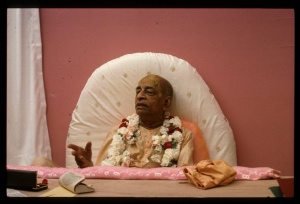SB 1.5.18: Difference between revisions
No edit summary |
(Vanibot #0054 edit - transform synonyms into clickable links, which search similar occurrences) |
||
| Line 24: | Line 24: | ||
<div class="synonyms"> | <div class="synonyms"> | ||
''tasya'' | ''[//vanipedia.org/wiki/Special:VaniSearch?s=tasya&tab=syno_o&ds=1 tasya]'' — for that purpose; ''[//vanipedia.org/wiki/Special:VaniSearch?s=eva&tab=syno_o&ds=1 eva]'' — only; ''[//vanipedia.org/wiki/Special:VaniSearch?s=hetoḥ&tab=syno_o&ds=1 hetoḥ]'' — reason; ''[//vanipedia.org/wiki/Special:VaniSearch?s=prayateta&tab=syno_o&ds=1 prayateta]'' — should endeavor; ''[//vanipedia.org/wiki/Special:VaniSearch?s=kovidaḥ&tab=syno_o&ds=1 kovidaḥ]'' — one who is philosophically inclined; ''[//vanipedia.org/wiki/Special:VaniSearch?s=na&tab=syno_o&ds=1 na] [//vanipedia.org/wiki/Special:VaniSearch?s=labhyate&tab=syno_o&ds=1 labhyate]'' — is not obtained; ''[//vanipedia.org/wiki/Special:VaniSearch?s=yat&tab=syno_o&ds=1 yat]'' — what; ''[//vanipedia.org/wiki/Special:VaniSearch?s=bhramatām&tab=syno_o&ds=1 bhramatām]'' — wandering; ''[//vanipedia.org/wiki/Special:VaniSearch?s=upari&tab=syno_o&ds=1 upari] [//vanipedia.org/wiki/Special:VaniSearch?s=adhaḥ&tab=syno_o&ds=1 adhaḥ]'' — from top to bottom; ''[//vanipedia.org/wiki/Special:VaniSearch?s=tat&tab=syno_o&ds=1 tat]'' — that; ''[//vanipedia.org/wiki/Special:VaniSearch?s=labhyate&tab=syno_o&ds=1 labhyate]'' — can be obtained; ''[//vanipedia.org/wiki/Special:VaniSearch?s=duḥkhavat&tab=syno_o&ds=1 duḥkhavat]'' — like the miseries; ''[//vanipedia.org/wiki/Special:VaniSearch?s=anyataḥ&tab=syno_o&ds=1 anyataḥ]'' — as a result of previous work; ''[//vanipedia.org/wiki/Special:VaniSearch?s=sukham&tab=syno_o&ds=1 sukham]'' — sense enjoyment; ''[//vanipedia.org/wiki/Special:VaniSearch?s=kālena&tab=syno_o&ds=1 kālena]'' — in course of time; ''[//vanipedia.org/wiki/Special:VaniSearch?s=sarvatra&tab=syno_o&ds=1 sarvatra]'' — everywhere; ''[//vanipedia.org/wiki/Special:VaniSearch?s=gabhīra&tab=syno_o&ds=1 gabhīra]'' — subtle; ''[//vanipedia.org/wiki/Special:VaniSearch?s=raṁhasā&tab=syno_o&ds=1 raṁhasā]'' — progress. | ||
</div> | </div> | ||
Latest revision as of 18:10, 17 February 2024

A.C. Bhaktivedanta Swami Prabhupada
TEXT 18
- tasyaiva hetoḥ prayateta kovido
- na labhyate yad bhramatām upary adhaḥ
- tal labhyate duḥkhavad anyataḥ sukhaṁ
- kālena sarvatra gabhīra-raṁhasā
SYNONYMS
tasya — for that purpose; eva — only; hetoḥ — reason; prayateta — should endeavor; kovidaḥ — one who is philosophically inclined; na labhyate — is not obtained; yat — what; bhramatām — wandering; upari adhaḥ — from top to bottom; tat — that; labhyate — can be obtained; duḥkhavat — like the miseries; anyataḥ — as a result of previous work; sukham — sense enjoyment; kālena — in course of time; sarvatra — everywhere; gabhīra — subtle; raṁhasā — progress.
TRANSLATION
Persons who are actually intelligent and philosophically inclined should endeavor only for that purposeful end which is not obtainable even by wandering from the topmost planet [Brahmaloka] down to the lowest planet [Pātāla]. As far as happiness derived from sense enjoyment is concerned, it can be obtained automatically in course of time, just as in course of time we obtain miseries even though we do not desire them.
PURPORT
Every man everywhere is trying to obtain the greatest amount of sense enjoyment by various endeavors. Some men are busy engaged in trade, industry, economic development, political supremacy, etc., and some of them are engaged in fruitive work to become happy in the next life by attaining higher planets. It is said that on the moon the inhabitants are fit for greater sense enjoyment by drinking soma-rasa, and the Pitṛloka is obtained by good charitable work. So there are various programs for sense enjoyment, either during this life or in the life after death. Some are trying to reach the moon or other planets by some mechanical arrangement, for they are very anxious to get into such planets without doing good work. But it is not to happen. By the law of the Supreme, different places are meant for different grades of living beings according to the work they have performed. By good work only, as prescribed in the scriptures, can one obtain birth in a good family, opulence, good education and good bodily features. We see also that even in this life one obtains a good education or money by good work. Similarly, in our next birth we get such desirable positions only by good work. Otherwise, it would not so happen that two persons born in the same place at the same time are seen differently placed according to previous work. But all such material positions are impermanent. The positions in the topmost Brahmaloka and in the lowest Pātāla are also changeable according to our own work. The philosophically inclined person must not be tempted by such changeable positions. He should try to get into the permanent life of bliss and knowledge where he will not be forced to come back again to the miserable material world, either in this or that planet. Miseries and mixed happiness are two features of material life, and they are obtained in Brahmaloka and in other lokas also. They are obtained in the life of the demigods and also in the life of the dogs and hogs. The miseries and mixed happiness of all living beings are only of different degree and quality, but no one is free from the miseries of birth, death, old age and disease. Similarly, everyone has his destined happiness also. No one can get more or less of these things simply by personal endeavors. Even if they are obtained, they can be lost again. One should not, therefore, waste time with these flimsy things; one should only endeavor to go back to Godhead. That should be the mission of everyone's life.